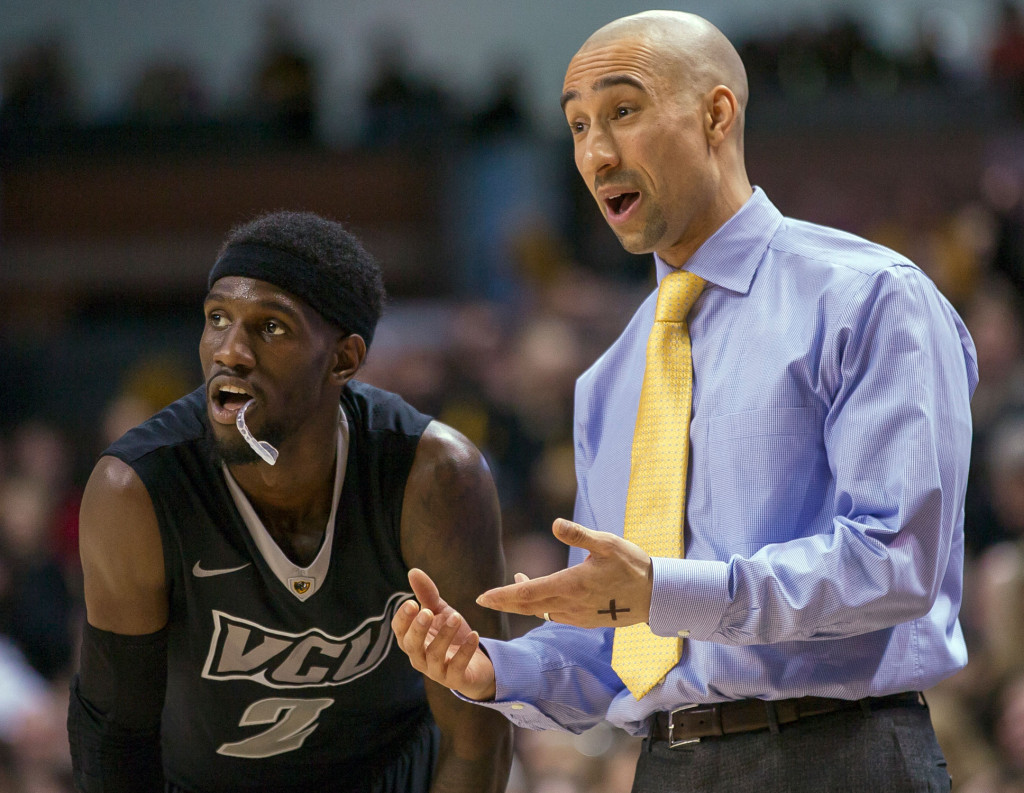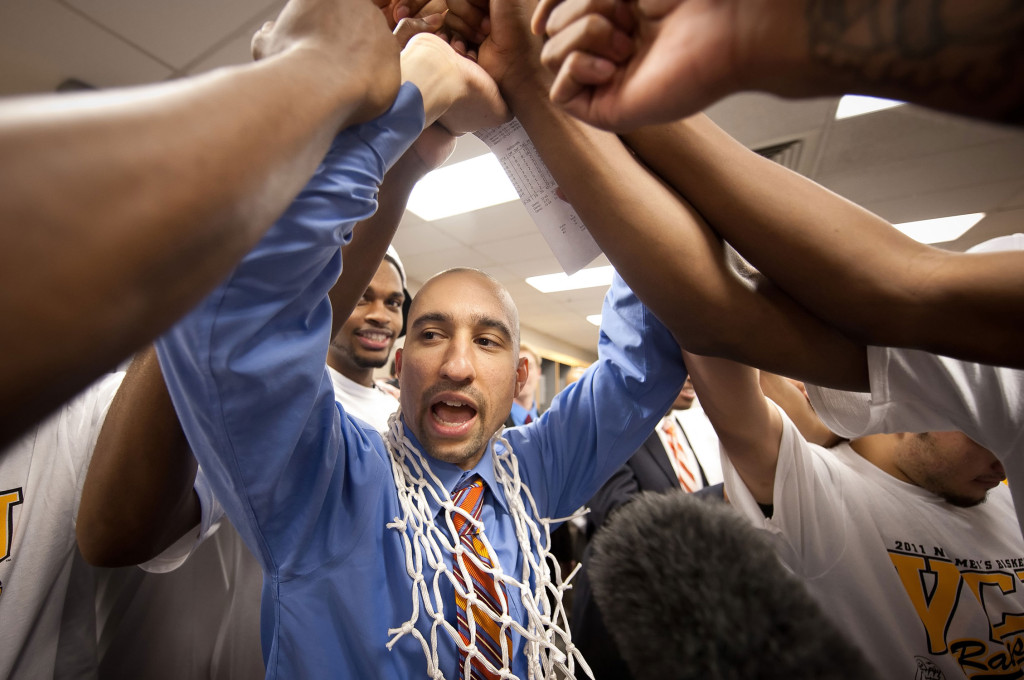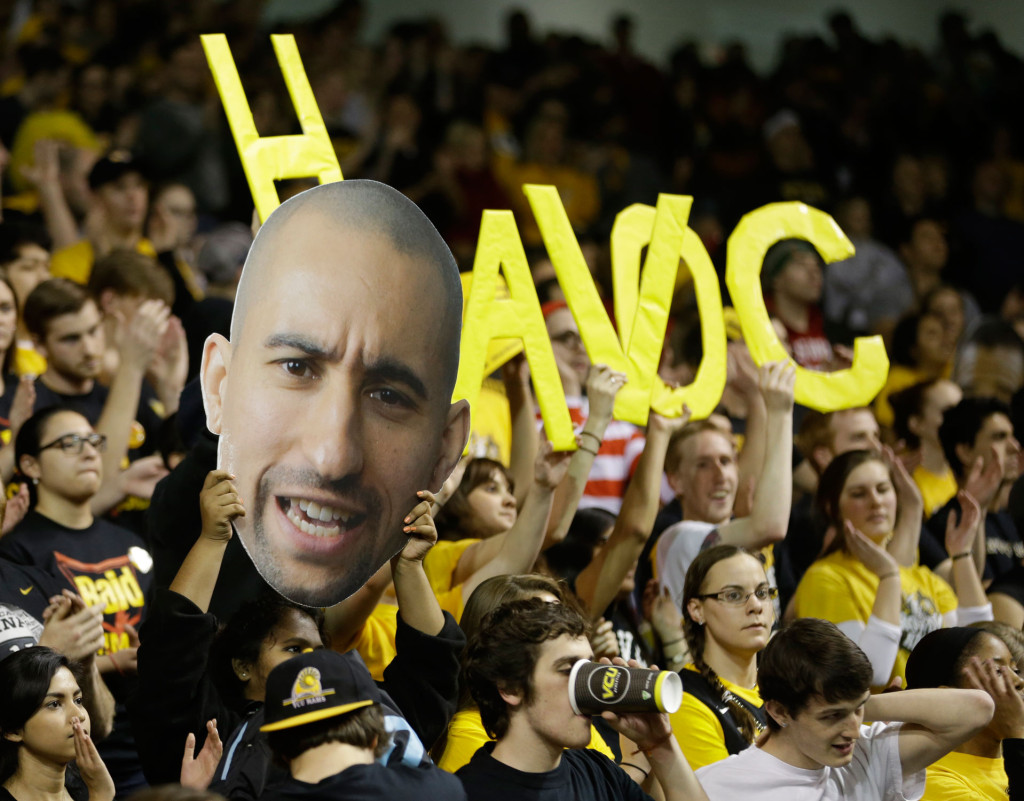FAIRFAX, Va. — Chaos was always the plan.
Right from day one, his introductory press conference on April 2, 2009, VCU head coach Shaka Smart announced to the world that his team was going to commit to being different. He had a plan and he intended to execute it as he saw fit.
“We are going to wreak havoc on our opponents’ psyche and their plan of attack,” he said confidently, pointing at his head.
Smart spells it HAVOC, in all capital letters. It’s not an acronym for anything, but the aggressive block text seems appropriate for the intensity of play it describes. It’s not simply a style of play — it’s the word that defines the personality of Smart’s team.
It’s also right there, on the backs of their warmups, in case you dare to forget.
But to play that hard takes a commitment, both to the idea of a team and to the idea of the system. You can’t do that without loving and trusting in those responsible for sharing the burden, or in the one telling you to trust in “team” over “me.”
While HAVOC expresses itself physically through hard-charging traps on defense, flailing arms and blurs of black and gold jerseys, it is, ultimately, a mental game. It’s about taking everything your opponent has learned and practiced in his basketball life and obliterating it into dust for 40 minutes.
And it works. Smart’s gone 154-52 in his five-plus seasons in Richmond, making the tournament each of the past four seasons, including a memorable trip all the way to the Final Four in 2011.
That success has drawn both praise and poachers. After last season’s disappointing early exit from the NCAA tournament, schools once again tried to pry Smart from Richmond. Over the past five years, he has received contract offers from established, major conference powers such as UCLA, Minnesota, North Carolina State, Illinois, USC and Marquette. And he has turned them all down to stay at VCU, to continue to build the Rams into a consistent winner.
Smart’s current contract can keep him at VCU through 2028. He could be making more than twice as much at a major conference school, but he seems more than happy with his roughly $1.5 million annual salary. In fact, instead of looking for a raise last year, Smart asked that any extra money be allocated back into the program. He is, quite literally, invested in VCU’s future.
* * *

This year may prove to be Smart’s toughest test yet. In the midst of a stunning home defeat against Richmond that snapped VCU’s 11-game winning streak, the Rams (18-6, 8-3 A-10) suffered a much bigger loss: Senior point guard and floor leader Briante Weber, just 12 steals away from the all-time NCAA record, tore the ACL and MCL in his right knee, ending his college career.
Just four days later, with Weber limping around in his warmups, cheering from the sideline, the Rams suffered another blow. The other senior in the lineup, leading scorer Treveon Graham, aggravated a high ankle sprain and did not return in a game the Rams won, 72-60, at George Mason. VCU dropped its next game in heartbreaking fashion, on a buzzer-beater at St. Bonaventure. And on Wednesday, they let a late lead slip for the first time all season, falling in an exhausting double-overtime grind at home to LaSalle.
“We’d love to have our best players on the floor, that’s for sure,” Smart said after the Rams’ win over Mason. “If guys go out, we’re not going to cancel the game or cancel the season. We need people to step up.”
Now, as VCU heads to D.C. this weekend to take on the Colonials once again, they are a far different team than the one that sent GW to a 24-point defeat less than three weeks ago. Graham will be back eventually, but instead of a battle-tested team led by a pair of senior starters, Smart’s club will be much more of a wild card come March.
They will lean heavily on JeQuan Lewis, the dynamic sophomore taking Weber’s starting spot at the point of the attack and the press defense. He’s scored in double figures in three straight games since taking over the starting role, and will need to continue to do so to make up for the defensive difference between what he brings and what Weber did.
When asked how his club would respond after the loss of Weber, Smart reminded everyone that while his leader would not be handling the ball anymore, he was still very much a part of the team.
“Well, he’s not dead,” he said, drawing a chuckle from the gathered media. “He’s still a big part of what we do. I told him, ‘You need to be the best assistant coach you can be.’”
* * *

During games, Smart doesn’t sit. He’s always standing, toes on the edge of the sideline, only breaking his concentration during quick stoppages to sneak sips from a water bottle tucked into the corner of the scorer’s table.
He is constantly barking out instructions, but he’s not yelling so much as directing. Unlike some coaches who alternate between berating their own players and haranguing officials, the most common thing out of his and his assistants’ mouths is “10!” — letting his players know the count on the shot clock on defense when it’s about to hit single digits.
“C’mon John!” he called to freshman backup point guard Jonathan Williams — getting more playing time now due to Weber’s injury — at one point in the Rams’ game against Mason.
Smart had noticed his guard jogging the ball across half-court and immediately turned to his bench to find a replacement. It wasn’t a reflection of a lack of hustle on Williams’ part — simply the need for fresh legs. To wreak HAVOC, one must have the engine at full throttle until the gas is gone.
With Lewis back in the game, the intensity ramped up again. After a teammate threw the sophomore an alley-oop, Weber sprung off the bench and onto his feet cheering. Smart turned around and patted his injured senior on the cheeks with a smile as if to say, “See? It’s going to be all right.”
It was all right that night at George Mason, as the Rams pulled away late for a 72-60 win. But after losing three of four, VCU has sunk back into a four-way tie for first in the conference, with GW and Davidson each just a game off the pace. The Rams have gone from clear-cut conference favorites potentially eying a deep NCAA Tournament run to a team that will be in a dogfight nearly every night from here on out.
* * *

HAVOC means staying in control while taking the contest out of it. It means a hard-fought game, every game, with bodies hitting the floor both voluntarily and not. It also means trust in each of your teammates to be in the right place to back you up.
But even using a deep rotation with frequent substitutions, there is attrition on your end as well. It shows up in the form of poor shooting as the legs begin to fatigue. The Rams ranked just 325th out of 351 teams in the country from the free-throw line (63.2 percent) entering Wednesday’s game. They also play very small, giving up several inches at each position to their opponents. That partially accounts for their negative rebounding differential, which ranked 280th before the LaSalle game.
Against George Mason, the Rams were out-rebounded by 16, but only outscored on second-chance points by a count of 14-7. Meanwhile, they won the turnover battle 18-8 and, more importantly, the points-off-turnover differential 27-9. Lose seven points due to your height, gain 18 back thanks to your hustle, win the game by 12. It’s the formula they’ll need to continue to work for them to succeed.
After all, they’re fourth in the nation steals (10.1), third in turnover margin (+6.6) and are tied for 13th in fewest turnovers on the other end.
“We’ve won before when we get out-rebounded,” said Smart after the game, and highlighted the importance of 6-foot-6-inch sophomore forward Mo Alie-Cox, often the largest Ram on the floor.
Cox threw down a thunderous dunk on the head of 6-foot-11-inch Shevon Thompson in that game, then wrestled a rebound out of his hands at the other end to complete a huge swing sequence. It was the kind of play that defined both VCU’s strength and their struggle.
“People ask us why our guys play so hard,” Smart said during a coaching clinic in 2013. “We don’t have magic dust. First, we make a point that anything less than 100% effort is unacceptable. Then I think the number-one reason our guys play so hard is because of our relationships with our players. We spend a lot of time with our players off the court.”
In order to win, the Rams need to play with more drive, more heart than their opponent. Smart sees his team as a family, and happily takes on the challenge of the fatherly role. His boys have grown into the Goliath in the Atlantic 10 over the past few years, but now find themselves both undersized and undermanned. They’ll be playing the role of David the rest of this year, poised with a slingshot of heart and HAVOC, ready to strike.





